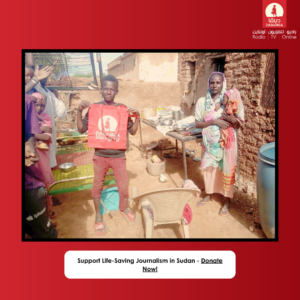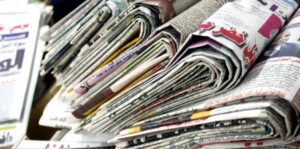Media crackdown: Sudan suspends correspondents’ work permits
(UPDATE 17:30) Sudanese newspapers and foreign correspondents’ work permits have been confiscated again by the Sudanese security service for their coverage of the ongoing protests against President Omar Al Bashir and the economic crises in Sudan, for the past weeks.
 Sudanese journalists taking a stand against the press curbs and violations against protesters in the past weeks (file photo/RD)
Sudanese journalists taking a stand against the press curbs and violations against protesters in the past weeks (file photo/RD)
Sudanese newspapers and foreign correspondents’ work permits have been confiscated again by the Sudanese security service for their coverage of the ongoing protests against President Omar Al Bashir and the economic crises in Sudan, for the past weeks.
On Monday, the security authorities confiscated El Jareeda newspaper for the ninth time in a row, and El Midan newspaper for the seventh time in a row, along with El Tayyar and El Baath newspapers after they were printed at the presses.
Journalists speaking to Radio Dabanga said that the prior censorship by the security service, the NISS, on newspapers has become more controlled. The publication of any material related to the demonstrations and the security forces’ violence against the demonstrators is banned.
In return, the publication of articles where demonstrators have conducted a criminal offence or are depicted as criminals, is permitted, as long as these persons have not had the opportunity to comment on it, a journalist informed this station.
Correspondents’ permits suspended
Sudanese authorities also withdrew work permits and press cards on Monday from journalists of Sudanese and foreign media agenies, including at the offices of Al Jazeera and El Arabiya TV Satellite channels in Khartoum, as well as correspondents of the Turkish Anadolu news agency. The correspondents of these agencies were summoned and asked to hand over their cards and informed that their work permits have been suspended for an indefinite period.
The permit of El Arabiya correspondent Saadeldin Hasan was withdrawn, as well as the permits of Anadolu correspondents Bahram Abdelmonim and Mahmoud Hajaj, and the correspondent of Al Jazeera English Hiba Morgan.
Meanwhile the renewal of work permits for the correspondents of Al Jazeera Ahmed El Ruheid, Osama Ahmed and Badawi Bashir was not extended. The authorities did not explain the reasons for the suspension of the correspondents.
Sudanese authorities have been unhappy with the media coverage by Sudanese and international television channels of the more than one month of uprising against the regime in the capital city and other cities since 19 December 2018.
Earlier this month the Sudanese information minister accused several satellite TV channels of fabricating ‘unrealistic scenes’ about the protests in Sudan.
“66 arrests of journalists, six cases of accreditation being withdrawn from correspondents of foreign media, and 34 seizures of newspaper issues.” – RSF
'100 press freedom violations'
The international Reporters Without Borders (RSF) organisation released a statement on Tuesday which reportedly sums up all the press freedom violations in the past month of protests. “They include 66 arrests of journalists, six cases of accreditation being withdrawn from the correspondents of foreign media, and 34 seizures of newspaper issues.
“The leading social networks meanwhile continue to be inaccessible except to those using VPN-type encrypted networks.”
Sit-in
On January 14, the NISS detained 28 journalists for several hours ahead of a planned sit-in to protest the pre-publication censorship on El Jareeda and El Baath newspapers, planned to be held in front of the headquarters of the security department in downtown Khartoum.
In protests the days before, members of the security service beat a number of journalists who were covering a peaceful march in Khartoum Bahri, detained and interrogated them.
“This comes at a time when the security service points to the Charter of Honour governing the media work in Sudan,” says one of the journalists, Yousef El Jalal, who was also suspended from his work for a Sudanese channel. “But this clearly shows that this charter is not equal to the price of the ink in which it was written.”
The Charter of Honour was signed in November by editors-in-chief of Sudanese newspapers and the NISS, stipulating that the security apparatus would not interfere in the publication policies of newspapers and abolish censorship, including pre-censorship.
Condemnation
The international Committee to Protect Journalists (CPJ) released a blog article on Thursday about the situation. ‘Newspapers are being forced to toe the government line, some steering away from covering the protest all together and others publishing blank spaces in the places assigned for protest coverage and opinion columns that support it.’
The European External Action Service (EEAS), the UN High Commissioner for Human Rights, the Troika (UK, US and Norway) and Members of the European Parliament (MEPs) have condemned the Sudanese authorities violent repression of protests and censorship and arrests of journalists.











 and then
and then